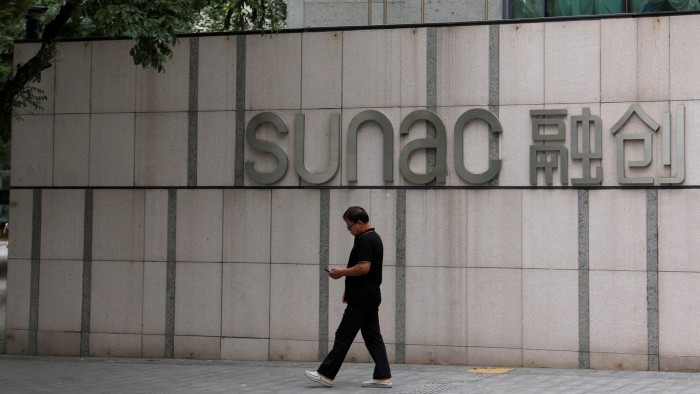Stay informed with free updates
Simply sign up to the Chinese business & finance myFT Digest — delivered directly to your inbox.
Shares in Chinese developer Sunac plummeted on Friday after the company revealed it was the subject of a petition in Hong Kong seeking to wind it up, the latest in a series of legal moves against heavily indebted mainland property groups.
The company said in a filing that the petition was issued by a Hong Kong unit of Cinda Asset Management, a state-owned bad-debt manager, and that a hearing was scheduled for March 19.
Sunac’s Hong Kong-listed shares fell 26 per cent to HK$1.30 (US$0.17) on Friday.
Sunac, formerly one of China’s largest developers, defaulted after the 2021 failure of its peer Evergrande sparked a sector-wide cash crunch. The fallout, which paralysed construction projects across China, continues to weigh heavily on economic confidence.
Evergrande, the world’s most indebted real estate company at the time of its failure, with liabilities in excess of $300bn, was the subject of a similar liquidation petition approved by a Hong Kong judge last year, though the vast majority of its assets are within mainland China’s distinct legal regime.
Country Garden, previously the biggest Chinese developer by sales and initially seen as well-shielded from the crisis, also faces a winding-up petition, with a hearing due this month. The company defaulted on its international debts in 2023.
It said on Thursday it had proposed a deal to cut $11.6bn from its debt pile, which stood at $16.4bn as of the end of 2023.
Dozens of Chinese property developers listed in Hong Kong and issued bonds to finance their activities, though issuance has dried up following the wave of defaults in 2021 and 2022. They also amassed large debts within mainland China.
Sunac said in late 2023 that it had received court approval for a $10bn offshore restructuring plan, one of the few of its kind to proceed. It is also in the process of attempting to restructure onshore debts.
Most petitions to wind up indebted developers have been presented by private creditors, although state-owned China Construction Bank last April filed a winding-up petition against Shanghai property developer Shimao.
Chinese authorities have taken various measures to boost the property market, including cutting mortgage rates and launching a scheme for state-owned enterprises to buy unsold properties.



